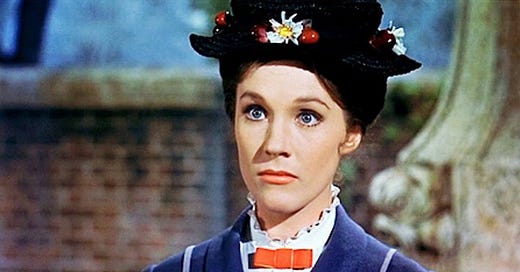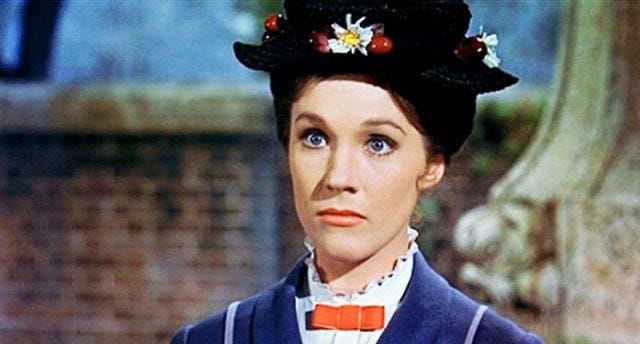Anything Can Happen If You Let It
Being a Mr. Banks in a world that tells me I should be more like Mary Poppins
This week's newsletter is brought to you by "Mary Poppins Jr.," the kids' version of the stage musical version of the 1964 film version of the books by P.L. Travers. My daughter's two-week summer theater camp is staging the show, and I have been humming songs from it non stop, much to the annoyance of everyone in earshot.
There is a certain all-consuming mania to being in a show, even when one is 9. I realized yesterday — after dropping my kid off at 9 in the morning for the last day of "camp" and not picking her up again until after 9 at night following their first performance — that it was the longest she had ever been away from Mom and Dad in her whole small life. This is, I realize, not typical. But it did leave me feeling a little uneasy, in a way that I really don't like feeling. What if she doesn't eat all her lunch because she's distracted and then she gets hungry and exhausted and overwhelmed? What if she forgets to use the bathroom? (This is a thing that actually happens.) What if she's too scared to go out on stage? Etc., etc.
To protect children from physical harm, we buy car seats, we childproof, we teach them to swim, we hover. How, though, do you inoculate a child against future anguish? For that matter, what do you do if your child seems overwhelmed by life in the here and now?
— "The Anxious Child and the Crisis of Modern Parenting," Kate Julian, The Atlantic, May 2020
To be frank, anxiety is a big part of my life. Maybe it's a big part of yours, too. In her article for The Atlantic, Kate Julian writes that "Anxiety is, in 2020, ubiquitous, inescapable, an ambient condition," and I have no doubt that 2021 has not bucked that particular trend. And a lot of anxiety — almost all of it, in fact — is worrying about what will happen.
There is nothing particularly threatening or sinister about this theater camp. My kid has done theater programs before; she has entered novel situations with kids and adults she didn't know, and thrived. The location was familiar, and she can bring her own lunch. But anxiety is often completely irrational. "Trusting your gut" if you have anxiety (or depression, or any number of other mental health conditions) is a really bad idea, because your "gut" will tell you lots of stupid, untrue things. I can always tell I'm feeling anxious because my train of thought, which usually meanders quite freely all over the place, will start single-mindedly pointing in only one direction: toward catastrophe.
And as an anxious person who is also a parent, I have to guard against the self-perpetuating cycle that Julian warns against: "When we shelter kids from difficulty or challenge ... we are not merely shielding them from distress; we are warding off the distress that their distress causes us."
This is why we give in, swoop in, sigh and say "OK," stop what we're doing, cancel plans, sleep on the floor of the nursery, tie the shoelaces, pack the lunch, put away the clean laundry and make the bed. We are warding off the distress our children's distress causes us, because we can't really deal with their distress.
Anything can happen if you let it. In the world of Mary Poppins Jr., this is posited as an unequivocally good thing, because, of course, in Mary Poppins' universe, the things that happen are magical and delightful and good. But "anything can happen" means something very different if you are anxious. It can mean that all your trains of thought start to steer toward catastrophe, if you are not careful to guard against it.
The Mary Poppins story — at least the Disney version of the story — tells us that Mr. Banks is too rigid and too mean and he was made that way by his rigid and mean nanny (Mrs. Andrews and her "brimstone and treacle"). He thinks his kids are too wild and that they need a rigid, mean nanny just like he had.
But the lie of Mary Poppins — the lie we all want to believe — is that we can become better parents to our children just by having a bit more heart, just a spoonful of sugar, just a bit more imagination. That it's just for lack of wanting, or trying, or knowing, that we are sometimes short-tempered or rigid or impatient or don't like being disturbed by someone singing "SUPERCALIFRAGILISTICEXPIALIDOCIOUS" and skipping around the living room while we're trying to get some work done. And if we are rigid or cross or impatient, then we are mean jerks who ought to go fly a kite and rediscover the lost magic of our childhoods, and that will wipe away all our worries, as simple as that.
Listen — I am not standing up for Mr. Banks. I very much do not want to be the Mr. Banks in this scenario. I would rather be Mary Poppins. We would all rather be Mary Poppins: the Manic Pixie Dream Mom (possibly a Time Lady) who doesn't have to follow your rules, man. But the thing about Mary Poppins is that she gets to leave. We don't. We are still here, in the living room, listening to the kids sing "SUPERCALIFRAGILISTICEXPIALIDOCIOUS" for the 47,000th time while we are desperately trying to finish our work so that we can start dinner on time for once in our lives and manage to get the kids into the bath before it gets too late. It is not for lack of wanting, or trying, or knowing. It is, maybe, because of more than a little bit of anxiety that we are less often whimsically flying kites and more often wishing someone might take the children to the nursery for the evening.
So here's to you, Mr. Banks. I raise my imaginary brandy snifter to you. As much as I wish I could talk to birds and dogs, and ice a cake with a snap of my fingers, the truth is that I'm more likely to yell at everyone if we are one minute late for something.
This has been an uncharacteristically Disney-themed edition of Think of the Children, a weekly newsletter about parenting, education, and related topics. If you have been enjoying this newsletter, won't you please invite a friend to subscribe? It's free and I won't ever sell or share your info, promise.




